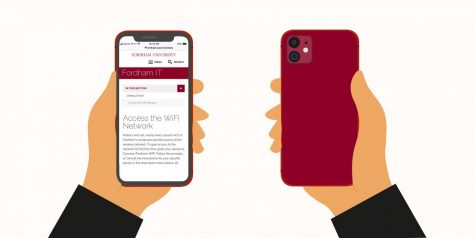Student Publications Continue to Publish Through Virtual Platforms
April 22, 2020
In light of the recent changes COVID-19 has inflicted on schools, businesses and families around the world, Fordham University’s student publications have had to adjust quickly. In addition to The Fordham Ram, Mode Magazine, The Ampersand and the paper must work remotely now and have all stressed the importance of continuing to put out content.
For the remainder of the spring semester, none of the aforementioned publications will be creating physical copies of their publications. The Fordham Ram, Mode Magazine and the paper will all be publishing via their websites. The Ampersand and Mode Magazine will be publishing through the Issuu web app. This is not entirely different from what the publications had previously been doing, since most of them were already publishing online, in addition to printing.
Student publications have had to integrate technology more centrally to their publishing process, which Emma Paolini, FCRH ’21, social media editor for The Ampersand said will prepare them for similar situations in the future if there are any.
Mackenzie Merriman, FCRH ’20, editor-in-chief of Mode, said that it would publish a magazine this semester, no matter what.
“There was no way we weren’t going to have a magazine some way or another, whether that meant less issues, receiving them at a later date or ultimately what we decided, going online,” she said.
The main issues they are facing are funding and distribution since alternative printing options must be considered and all students are currently away from campus. Another result of the COVID-19 changes is turbulent communication, especially with newer members who are not familiar with the platforms that Mode uses, according to Merriman.
“It is also different in the sense that me and my team are no longer able to sit in person together and bounce ideas back and forth for finalization of the magazine. Yes, there is Zoom and video calling, but it is definitely different,” she said.
Mode saw a decline in member involvement since it started working remotely, as did the paper. However, Merriman said she is “beyond confident” that what Mode produces this semester will be no less “amazing” than usual.
In efforts to make up for the lack of print copies, The Ampersand is keeping up an active social media presence and sharing literary-related content including books that the executive board is reading, said Paolini. Additionally, they just concluded e-board elections and have had a Zoom-mediated book club meeting, although they are disappointed that they haven’t been able to meet regularly, she said.
Anyone from Fordham can submit pieces to The Ampersand, so Paolini said she stresses the importance of continuing to publish and how that can bring students together.
“I think that student publications bring students together in a unique way,” Paolini said. “In a time when we’re all scattered across the country and even the world, I think hearing those campus voices is more important than ever.”
Suresh Hanubal, FCRH ’21, coeditor-in-chief of the paper, said that the paper is still accepting submissions as well.
“I do think it is good for student publications to continue to publish content if only to distract from the COVID-19 pandemic,” he said.
Merriman said publishing gives students a sense of normalcy for both those who produce content and those who read it.
Being forced to think quickly and adapt has taught student publications various lessons.
“The future is unpredictable, and whether it’s because of a pandemic or just a snow day, it’s always good to have a backup plan,” said Paolini.
Merriman had a similar takeaway.
“Always have a backup, a plan A, B and C. You never know what can happen,” she said.


If you want a picture to show with your comment, go get a gravatar.